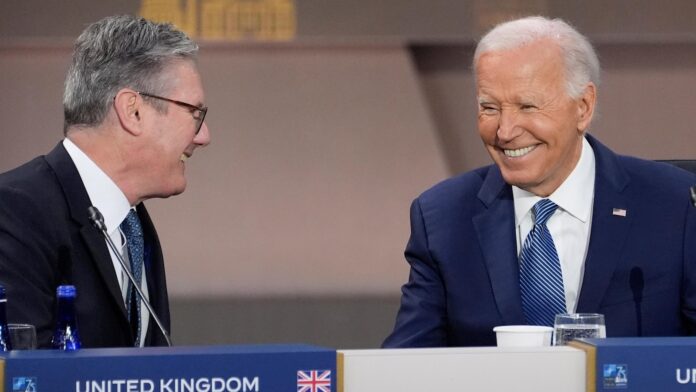WASHINGTON — Newly elected British Prime Minister Keir Starmer makes his first appearance on the international stage with a strong signal of support for Ukraine while attending the NATO summit in Washington.
After he and other European leaders met with US lawmakers, Starmer sat down with Ukrainian President Volodymyr Zelenskyy on Wednesday. They hugged and leaned in, smiling, before speaking privately. He then reaffirmed Britain’s support for Kiev in its fight against the Russian invasion.
Starmer said he and his new Labour government would “use the opportunity here with our allies to ensure that support is endorsed by NATO members”.
Arriving for the summit, Starmer added that it was also important for him “in some sense as a message to (Russian President Vladimir) Putin, to reinforce the resolve of NATO – now bigger than ever, more united than ever and absolutely clear about the threat of Russian aggression.”
Starmer will also hold a one-on-one meeting with President Joe Biden, with both leaders expected to reaffirm the “special relationship” between the US and Britain that has been a hallmark of transatlantic cooperation for more than a century.
During the summit’s arrival ceremony, Biden and Starmer held their handshake a little longer than Biden did with the other leaders, although their words were not audible.
Starmer left London after being elected in a landslide victory on July 4. He says his message to the world from the UK is: “We’re back”, after years of fighting with European neighbours over Britain’s divorce from the European Union and an exhausting political soap opera at home.
He has put security — including the economy, energy and defence — at the heart of his plans. He wants to rebuild ties with the EU after Brexit, including by signing a defence and security pact with the 27-nation bloc, and assuring Ukraine that there will be no change in British support.
He has pledged to increase Britain’s defence spending from 2.3% to 2.5% of gross domestic product. But he has not said when, unlike the previous Conservative government, which promised to do so by 2030. The Conservatives have also presided over cuts to the British armed forces during their 14 years in power.
Starmer said his government will review defence strategy and spending, a process that could take up to a year, before setting a date for the 2.5% target.
The new prime minister says he has transformed the centre-left Labour Party since taking over in 2020 from Jeremy Corbyn, a left-wing critic of NATO who once pledged to scrap Britain’s nuclear submarines.
Starmer “will really want to demonstrate his credentials as a credible international statesman. And he will also want to fight against those old Conservative lines of attack, that Labour is bad for security, that they are bad on foreign policy,” said Victoria Honeyman, a senior lecturer in British politics at the University of Leeds.
“Keir Starmer doesn’t really need to make a big splash at the moment,” she added. “He doesn’t need to cause any trouble. What he needs to do is create some goodwill to make some friends, build up some political capital.”
Starmer now says Labour is “the party of national security”, with an “unwavering commitment to NATO” and a pledge to retain Britain’s nuclear weapons.
But as Starmer and his team, like other NATO allies, try to make a good first impression on the Biden administration, and prepare for the possible return of Donald Trump.
Starmer’s new government insists the transatlantic “special relationship” transcends individual prime ministers and presidents. But some of Starmer’s priorities, such as tackling climate change and making the UK a clean energy superpower, are unlikely to be shared by Trump.
In his remarks upon arrival at the NATO summit, Starmer stressed how important these issues are to his government.
Starmer said his summit meetings were “an opportunity to make sure those relationships are reset, so that I can say that our position on the world stage – leading on things like defence and security, climate change and energy – is so important.”
The new foreign secretary, David Lammy, a Harvard Law School graduate with strong ties to the US, has been sent out in recent months to meet Republicans and Trump allies.
Lammy once called Trump a “neo-Nazi sympathizing sociopath” but said earlier this year that the former president’s attitude toward NATO had been misunderstood. He said he did not think Trump wanted the US to abandon its European allies, but “wants Europeans to do more to ensure a better-defended Europe.”
In a meeting with Secretary of State Antony Blinken on Wednesday, Lammy praised the partnership. “The special relationship means something, not just for our own countries, but for the defense of freedom around the world,” he said.
Blinken opened the meeting with similar remarks. “This is not just a special relationship, it is an essential one,” Blinken said. “We are together — the United Kingdom and the United States — at every critical point of our time.”
___
Lawless and Kirka reported from London.



